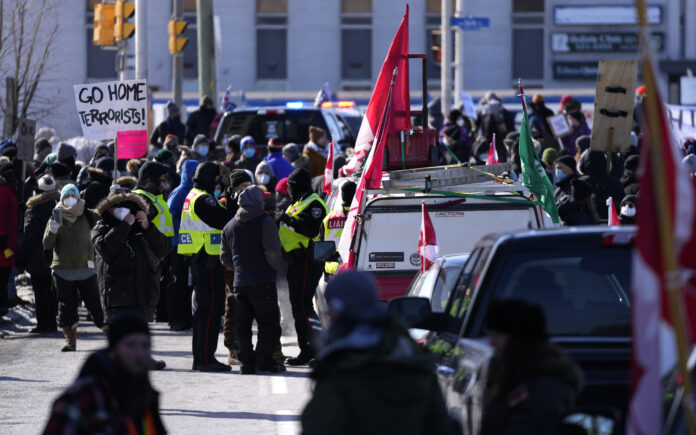The federal government is giving itself never-before-used emergency powers in order to quash the ongoing blockades in Ottawa and elsewhere, and some Canadians have been left scratching their heads about the impact it will have on their lives.
Meanwhile, police are already notifying demonstrators in the downtown core that the new order will affect their blockade. In a pamphlet wedged into truck doorways and slapped under windshield wipers, police warned the blockaders that they “must leave the area now.”
“The Federal Emergencies Act allows for the regulation or prohibition of travel to, from or within any specified area,” it warns.
The Emergencies Act can be used in different ways depending on the kind of emergency it’s trying to address. On Tuesday night, the government laid out the regulations that detail exactly how they intend to use the law to tackle the blockades.
So what do these new emergency measures actually do, and how could they impact you? Here’s what you need to know.
The Emergencies Act was enshrined into Canadian law in 1988, replacing the War Measures Act, which Trudeau’s father, Pierre Elliott Trudeau, invoked during the FLQ crisis in 1970. The Emergencies Act was intended as a more restrained piece of emergency legislation — one that sets out strict criteria for the circumstances when its powers can be used.
Canada invokes Emergencies Act for first time to confront border blockades
The government formally laid out its rationale for invoking the Emergencies Act in an executive order on Tuesday. They argued the blockades are an emergency, and those involved have vowed to push back at efforts to clear them, which officials believe involved plans to use “serious violence” for “a political or ideological objective.”
The Act only stays in place for 30 days.
The regulations make one thing abundantly clear: you can’t legally travel to the blockade in Ottawa, and you’ve got to leave if you’re already there.
You also can’t help the blockaders out — so no bringing food, or fuel.
In the Canada Gazette, where the government published its regulations were published on Tuesday, it’s explained that the order implements “measures to regulate or prohibit any public assembly” that “may reasonably be expected to lead to a breach of the peace.”
Trending Stories
Ottawa police issue new warning amid convoy blockade: ‘leave the area now’
Feds scrapping pre-arrival COVID PCR test requirement for fully vaccinated travellers
Travel to, from or within a “specified area” is also prohibited in the regulations, as well as the use of “specified property, including goods to be used with respect to a blockade.”
Finally, it designates some places as “secure” and “protected,” including what it calls “critical infrastructure” — including international and interprovincial bridges, hospitals, and COVID-19 vaccine locations.
If you’re caught breaking this rule — or any of the others — laid out in the Act, there are consequences. If you’re facing a summary conviction, you could be slapped with a fine of up to $500 or up to six months imprisonment.
If you face an indictment — which is more serious than a summary conviction — you could be hit with a fine of up to $5,000 or sent to prison for up to five years.
Plenty of families have brought their children with them to the protests. Just eight days ago, the Ottawa Police Service warned that nearly 25 per cent of the 418 trucks parked in downtown Ottawa “have children living in them.”
Now, the government has made it a punishable offence to bring kids anywhere near the blockades.
The regulations detail that kids under 18 are not allowed to travel “to or within 500 metres of” any of the convoy demonstrations. Contravention of this rule could lead to a fine or time behind bars.
Not only are children not allowed to come near the convoy blockades, but foreign nationals are also barred from coming to Canada with plans to join the demonstration.
The regulations state that a foreign national “must not enter Canada with the intent to participate in or facilitate” the blockade demonstrations.
In the same breath as Trudeau announced his plans to invoke the Emergencies Act on Monday, he also shared that the Canada Border Services Agency has “already” started to turn back “non-Canadians trying to enter Canada to participate in blockades.”
As part of the regulations, Canada can also authorize or direct “any person” to render “essential services.”
That means the government can direct tow companies, for example, or other service providers to remove, store or tow vehicles or structures participating in blockades.
The goal of this order, according to the regulations, is to “relieve the impacts of the blockades on Canada’s public and economic safety.”
Anyone who is directed to do something, like towing a vehicle, must “comply immediately” with the request — and the regulations assure them they’ll be paid “the current market price” for whatever they’re asked to do, or provide.
Finally, the government is empowering itself to hit blockade participants right in their pocketbooks.
The government will be able to prohibit or regulate the “use of property to fund or support the blockade,” according to the regulations — which means the feds can put a plug in the convoy’s potential revenue streams.
They can also require “any crowdfunding platform and payment processor” to report suspicious transactions to the Financial Transactions and Reports Analysis Centre of Canada (FINTRAC).
On top of that, “any financial service provider” will be required to determine whether they have, in their possession or control, “property that belongs to a person who participates in the blockade.” If they find evidence of this, the financial institutions, like banks, have to report it to the RCMP or CSIS.
© 2022 Global News, a division of Corus Entertainment Inc.



